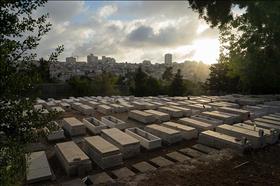Back to the Supreme Court:
Hiddush's next battle over pluralistic burial in Israel
Hiddush submitted a new petition aimed at further expanding religious freedom in Israel in general and pluralistic burial alternatives in particular.
18/07/2019 16:07
Tags: burial · Ministry of Religious Services · Land Authority

A Jerusalem cemetery, image by
Judith Scharnowski, Pixabay
Today Hiddush submitted a new petition aimed at further expanding religious freedom in Israel in general and pluralistic burial alternatives in particular. Following upon the victory that Hiddush scored earlier this month at the Supreme Court, forcing the IDF to break the monopoly of the Orthodox Military Rabbinate on military burial, we have now moved on to the next battle over pluralistic burial. This most recent petition challenges the Minister of Religious Services and the Israel Land Authority for failing to meet their legal obligation to provide civil burial alternatives throughout the country.
The urgency of Hiddush's petition lies in the fact that civil burial is unavailable for most Israelis. This includes all residents of Jerusalem, Tel Aviv, and many other smaller communities. The law (already back in 1996) entrusted the responsibility to establish alternative civil cemeteries to the Minister of Religious Services. Despite the many years that have gone by, the Ministers have all failed to meet this responsibility.
A scathing report by the State Comptroller in 2009 detailed and decried the State's failure, but instead of acting upon the Comptroller's rebuke and finally establishing these cemeteries the Government has targeted and shut down civil burial services offered by some kibbutzim to non-residents (which used to provide a partial remedy to the problem). Hiddush's petition focuses on the refusal of the Ministry and the Land Authority to at least temporarily allow the continuation of these readily available solutions offered by the kibbutzim, even if only on a temporary basis until the State meets its obligation.
It is clear that the long-term inaction and recent further undermining of non-Orthodox burial alternatives is directly connected to the fact that burial has been the responsibility of the Ministry of Religious services for decades.
It is clear that the long-term inaction and recent further undermining of non-Orthodox burial alternatives is directly connected to the fact that burial has been the responsibility of the Ministry of Religious services for decades. This Ministry has been entrusted by most Israel Coalition Governments to the religious parties who are the main culprits responsible for blocking religious freedom and equality. It is hoped that in addition to the beacon of light that is the Supreme Court, the upcoming elections, characterized by rising public frustrations over the clash of religion-&-state, will herald the dawn of a civil unity government to advance the principles of religious freedom and equality, as long desired by the public.
As to Hiddush's victory on military burial, the Jerusalem Post dedicated its editorial to this historic achievement, following upon the heels of the Supreme Court hearing- 'MILITARY FUNERAL FREEDOM':
"Freedom in matters of religion and state took a huge and significant step on Thursday after the NGO Hiddush announced that the IDF will allow Reform rabbis to conduct military funerals for fallen soldiers, complete with all of the traditional military characteristics.
"The ruling came two years after a petition was filed by Attorney Uri Regev on behalf of the Hiddush Association for Religious Freedom and Equality against the IDF, claiming that non-Orthodox soldiers faced discrimination since their families were not being allowed to choose the rabbi they wanted to officiate at their child’s military funeral service.
"The petition claimed that the IDF did not allow Jewish soldiers to be buried according to their faith, instead forcing soldiers to submit to an Orthodox ceremony run by the IDF Rabbinate Corps. For decades, as The Jerusalem Post’s military correspondent Anna Ahronheim reported on Friday, military orders dictated that soldiers must be buried by an IDF rabbi in accordance with Jewish law. That meant it had to be an Orthodox ceremony."
READ MORE>>>